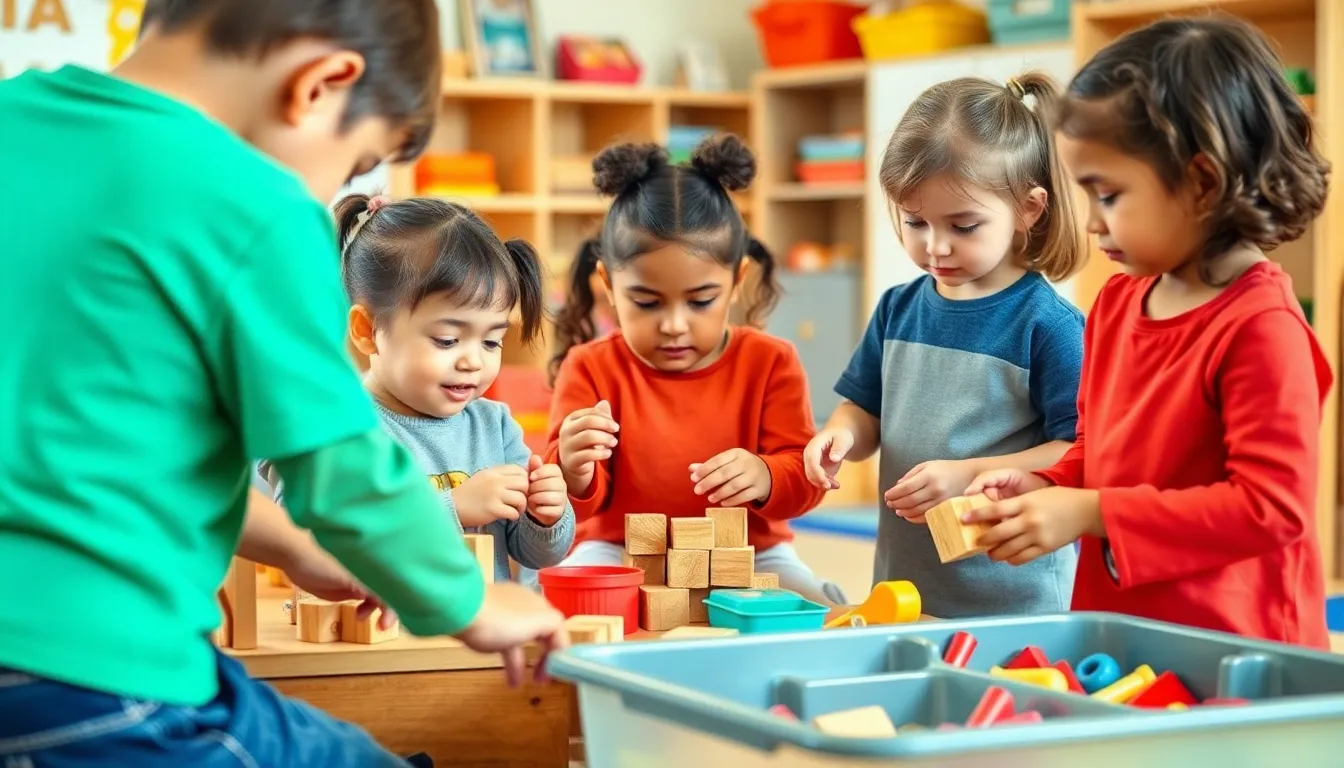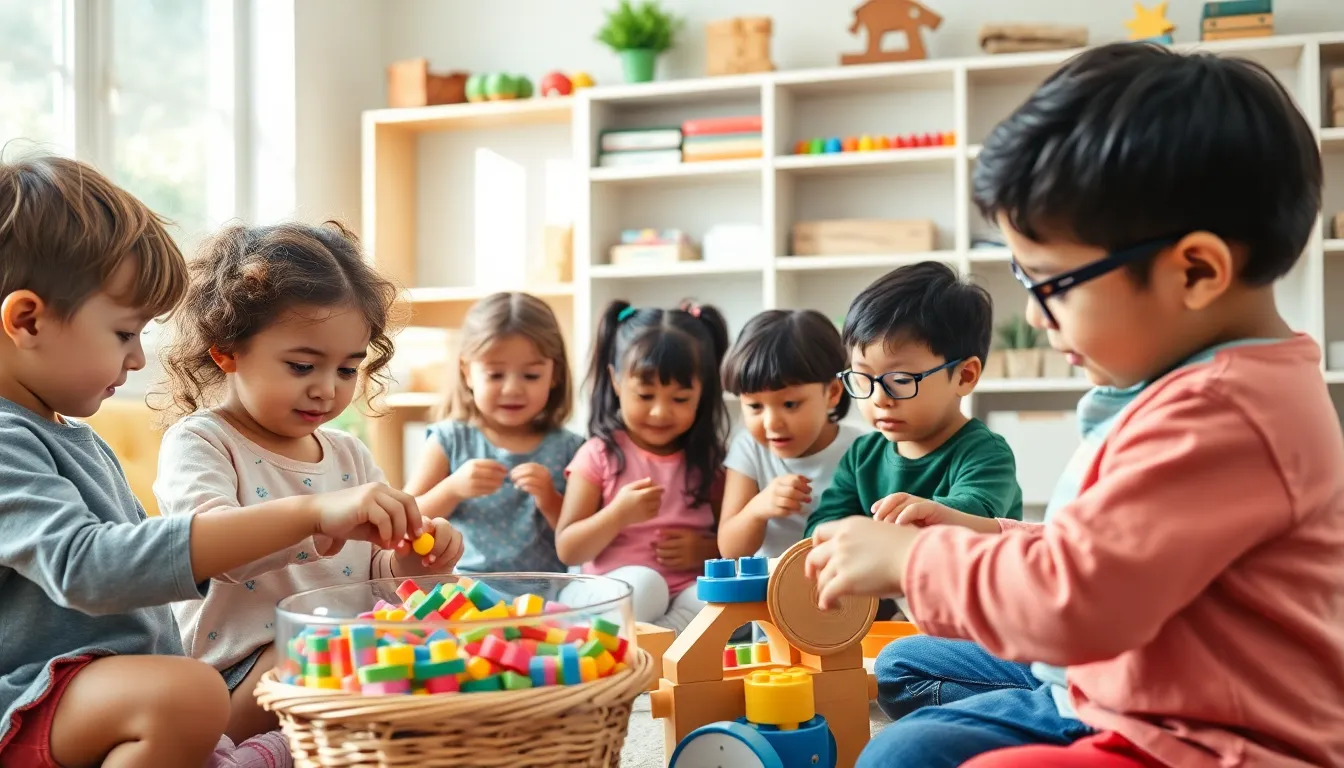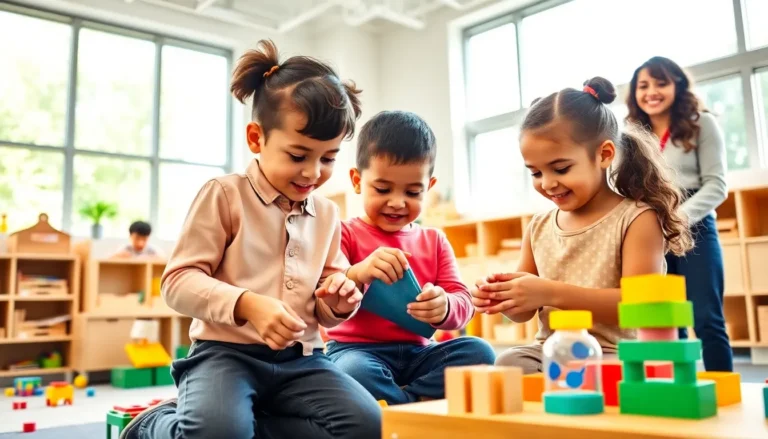Imagine a world where kids learn at their own pace, explore their interests, and develop a love for learning—all while having a blast. Welcome to the enchanting realm of Montessori preschools. These innovative educational spaces ditch the traditional cookie-cutter approach, replacing it with vibrant environments that spark curiosity and creativity.
Table of Contents
ToggleOverview Of Montessori Preschool
Montessori preschools focus on child-led learning experiences. They emphasize individualized instruction, allowing children to follow their interests and develop skills at their own pace. Learning environments are designed to be engaging, with materials that encourage hands-on exploration and discovery.
Characteristics of Montessori preschools include mixed-age classrooms. These setups foster peer learning, where older children help younger ones, promoting cooperation and leadership skills. Children also choose their activities, enhancing their decision-making and self-regulation.
Curriculum areas in Montessori preschools typically encompass practical life, sensory activities, language, and mathematics. Each area supports the development of critical thinking and problem-solving abilities. Children engage with tangible materials that make abstract concepts more accessible.
In addition, Montessori preschools often integrate outdoor activities. Nature exploration strengthens a child’s connection with the environment, fostering curiosity and appreciation for the world around them. Physical activity is encouraged, contributing to overall well-being.
Assessment in Montessori preschools occurs through observation rather than tests. Teachers assess individual progress by observing children’s interactions and engagement with activities. This approach nurtures a love for learning and reduces academic pressure, allowing children to thrive.
Parents are often involved in the Montessori experience, reinforcing the home-school connection. Communication between educators and families promotes an understanding of each child’s development. This collaboration is essential in supporting children’s learning journeys.
Montessori preschools create environments where children flourish academically, socially, and emotionally. They prepare young learners for future educational experiences, fostering independence and a lifelong passion for knowledge.
Key Principles Of Montessori Education

Montessori education revolves around several core principles that create an effective learning environment. These principles focus on nurturing the child’s natural development and fostering a passion for learning.
Child-Centered Learning
Child-centered learning emphasizes the individual needs and interests of each child. In this approach, children choose their activities, allowing for personal exploration and self-discovery. This autonomy encourages independence and responsibility in learning. Instructors guide rather than direct, observing as children engage in their chosen tasks. With mixed-age classrooms, peer-to-peer interaction enhances social skills and collaborative learning. Children learn from one another, fostering a sense of community. Respect for each child’s unique learning pace helps cultivate a positive environment, promoting self-confidence and motivation.
Hands-On Activities
Hands-on activities play a vital role in Montessori education. Engaging with tangible materials allows children to grasp abstract concepts effectively. Practical life skills teach children everyday tasks like pouring, sweeping, and buttoning, promoting fine motor development and coordination. These activities serve to connect learning with real-life experiences. Children explore sensory materials that stimulate curiosity and enhance perceptual skills. The active participation in learning fosters deeper understanding and retention of information. Such engagement not only boosts confidence but also encourages a sense of accomplishment as children see the results of their efforts.
Benefits Of Montessori Preschool
Montessori preschools provide numerous advantages that contribute to children’s overall development.
Individualized Learning Pace
Children thrive in Montessori preschools due to their ability to learn at individualized paces. Each child engages with materials that suit their unique interests and developmental stages. They explore subjects that captivate them, which fosters intrinsic motivation. Observation-based assessments allow educators to tailor activities that align with each child’s progress. This personalized approach nurtures a deeper understanding of concepts, reducing stress often associated with traditional learning environments. As children choose their activities, they cultivate decision-making skills that enhance their learning experience.
Fostering Independence
Fostering independence is a central tenet of Montessori education. Children navigate their learning environments with minimal adult intervention, allowing them to take ownership of their educational journeys. They learn practical life skills, such as self-care and problem-solving, which build confidence and self-sufficiency. Collaborative activities teach teamwork and responsibility while encouraging peer-assisted learning. Montessori environments prompt children to set goals and reflect on their progress, reinforcing their sense of autonomy. As they make decisions about their activities, they develop critical life skills beneficial for future endeavors.
Curriculum And Environment
Montessori preschools create dynamic learning environments rich with opportunities for exploration and growth. The curriculum emphasizes hands-on experiences, allowing children to engage with materials that enhance their understanding.
Learning Materials
Montessori classrooms feature diverse learning materials tailored to various developmental stages. Teachers select manipulatives that promote active engagement and facilitate exploration in subjects like math, language, and practical life. Materials such as classic Montessori beads, sensory bins, and cultural artifacts encourage independent learning. Children develop critical skills through tactile interaction, reinforcing concepts like counting and early literacy. The structured yet flexible approach permits children to revisit materials, deepening their understanding and fostering intrinsic motivation.
Classroom Setup
Classroom environments in Montessori preschools are intentionally designed for accessibility and independence. Mixed-age arrangements foster collaboration, allowing older children to mentor younger peers. Learning areas are distinct, with designated spaces for different subjects and activities. Natural light, orderly layouts, and inviting materials create an atmosphere that nurtures curiosity. Children move freely throughout the classroom, selecting activities that spark interest and foster self-directed learning. Each aspect of the classroom setup reinforces the Montessori philosophy of child-centered education, supporting personal growth and autonomy.
Comparing Montessori Preschool To Traditional Preschools
Montessori preschools differ significantly from traditional preschools in their approach to education. Individualized learning experiences define Montessori environments, allowing children to progress at their pace. Traditional preschools often implement a standardized curriculum that promotes uniform progression through grades and skills. This difference shapes how children engage with learning materials.
Structured classrooms characterize traditional preschools, where teachers direct activities and lessons. In contrast, child-led exploration defines Montessori settings, encouraging children to choose their activities based on interests. This autonomy fosters a sense of ownership over learning, unlike the more rigid structure of traditional environments.
Assessment methods also vary. Montessori preschools utilize observation to gauge student progress without the pressure of formal testing. Traditional preschools emphasize tests and grades, which can create anxiety in children. Montessori’s nurturing approach promotes a love for learning that may not be present in traditional settings.
Mixed-age classrooms enrich the Montessori experience, facilitating collaboration and mentorship. Older children often support younger peers, enhancing social skills and fostering community. Traditional preschools generally group children by age, limiting opportunities for peer learning and diverse interactions.
Practical life skills play a central role in Montessori education, as children practice real-life tasks that integrate learning with daily experiences. Traditional preschools may focus more on academics, often lacking opportunities for hands-on, practical learning. This difference impacts how children develop essential skills.
Ultimately, the overall atmosphere in Montessori preschools emphasizes exploration and creativity. Bright environments with accessible materials account for children’s curiosity and independence. Traditional preschools can appear more formal and less conducive to free exploration. Differences in philosophies and methods between Montessori and traditional preschools significantly influence children’s early learning experiences.
Montessori preschools stand out as nurturing environments that prioritize individualized learning and foster a genuine love for education. By encouraging children to explore at their own pace and engage in hands-on activities, these schools cultivate independence and critical thinking skills.
The focus on mixed-age classrooms promotes collaboration and peer learning, allowing children to develop social skills in a supportive setting. With an emphasis on practical life skills and observation-based assessments, Montessori preschools create a stress-free atmosphere that inspires creativity and exploration.
Ultimately, the unique approach of Montessori education equips children with the tools they need for lifelong learning, setting a solid foundation for their future academic and personal success.




